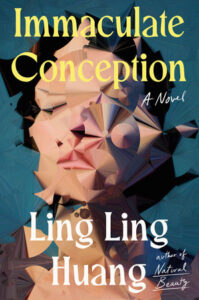
Against Algorithms: Why Tuning Out is an Essential Part of the Creative Process
Ling Ling Huang on the Importance of Keeping True to Your Own Thoughts
When my content generating algorithms discovered I was pregnant, I became an auto-buy zombie. Every moment, new products and parenting methods were presented to me as being the only thing that could prevent the death of my baby. Infinite inputs were an illness for me, everything going viral a virus which was eradicating my agency, and even my identity. They make it so easy to become someone you had no intention of becoming.
Yes, online spaces can be incredible for community-building, for the gathering, witnessing and documentation of civil rights, and are important channels for mutual aid. But algorithms dominate these spaces, and they don’t care about appealing to our higher brains or being co-creators of our best selves. Tristan Harris said that, “With technology, you don’t have to overwhelm people’s strengths. You just have to overwhelm their weaknesses.” Algorithms engage our lizard brains, and in doing so, they carve us away from our communities and atomize our attention.
If as Simone Weil has said, absolute unmixed attention is prayer, what or who are we praying to when we let TikTok take the reel? It’s no wonder familiar practices of spirituality are in decline, when our sacred and meaningful objects these days are mirrors that reflect reinforced versions of ourselves back to us.
Algorithms engage our lizard brains, and in doing so, they carve us away from our communities and atomize our attention.
In my second novel, Immaculate Conception, our country is embellished with sleek silver sculptures called buffers. From a birds-eye view, I envisioned them to look like rivers, raised and immobilized. While initially advertised as public art, these sculptures serve a much more nefarious purpose—they were designed to cut communities off from one another. They don’t just fracture the country by consigning people to different spaces, but to different realities. Each side of every buffer is made of screens, and what you see when you look at one is an extension of your world. If you’re wealthy, you’re on one side, in the enclave. If you’re not wealthy, you belong to the fringe, and the buffer keeps you powerless to even imagine the wealth with which you may have once aspired to have.
I created these buffers as a physicalization of content recommendation algorithms and how they work in our world, bracketing us away from one another, creating apps and playlists and pages that are “for you” but really “create you.” Jaron Lanier wrote that algorithms make the future the past, and I think that applies to our identities, too. These algorithms reinforce ourselves as we have been, perpetuating our past selves at the cost of who we might have become.
I began to realize there was a problem when every viewpoint I came across online was one I agreed with…could have written myself, but didn’t need to because someone else had already done it. In fact, everyone who believed the same things and had written about them were collected in one place and presented to me. That could only mean that a large swathe of people had fallen out of view…had been edited out of my life without my consent or knowledge.
There was no longer any need to do the hard work of thinking for myself, when there were so many who would do it for me, and it became easier to let the machine suggest what my thoughts were on any given subject. But thinking for myself, specifically waking up and trying to come up with new ideas as a writer, is what I have tried to do with my life. I would sit at the computer and write a passage, and wonder if I was having original thoughts, or just regurgitating paler versions of stories or ideas I had briefly encountered and forgotten just as quickly.
Content generation algorithms ended up having the strange effect on me—I got farther and farther away from myself in this way, went months without a dangerous thought—those ideas that feel truly original and unconscious, rather than the smooth thoughts produced by algorithms that slide down the throat like raw egg yolks, coming up just as easily.
Becoming a mother has, in some ways, freed me from the infinite inputs. My child is so in tune with their needs and their body. So much of my life has been about denial and repression: denying and repressing hunger, rest, and various emotional needs. I’m learning to listen to myself again, inspired by my child’s ability to feel and to express those feelings.
The last time I spent this much time with children, I was working at an outdoor preschool summer camp which was philosophically developed from the Forest Kindergarten movement, as well as the constructivist approach to how children learn. We spent the days fully immersed in nature, with the goal of the children having a strong sense of identity.
After my child was born, my phone was still telling me all the things I needed to buy in order for them not to become a serial killer, but it helped that postpartum, I lost my device a thousand times a day. There was no longer time for screen time, and when I had the energy to do anything, it became important to go outside. I thought back to those days at the outdoor preschool. We made do with so little…blankets and books. Any ‘toys’ or ‘art supplies’ were things we found in the forest around us. At the heart of the philosophy of Forest Schools is the belief that everything we need to be entertained and engaged in narrative creation is around and within us.
It doesn’t feel preposterous to suggest…that a writer must preserve a mind of their own to write fiction.
The philosopher Byung-Chul Han has described how people living in post-Internet society may “no longer have an unconscious.” I think the unconscious still exists, but has simply atrophied, and like a muscle, needs to be exercised. I’ve begun to implement a exercises to mitigate the corrosive effects of the attention economy on my creative practice. Limiting and structuring inputs has been especially effective–specifically, reducing the kind of inputs that try to solicit a specific response. Music without words, books, and nature are exceptions, because they suggest avenues for subconscious exploration and offer interaction and self-interrogation, as opposed to seeking reaction. Inputs are the collaborators of my unconscious, and this way, I have a hand in choosing who gets to shape my zeitgeist.
When my child is sleeping, and I should be working or cooking or cleaning or moving my body around, I opt, instead, to walk around slowly outside or to lay in bed. This isn’t bed rotting: staying in bed doing passive activities as self-care. This isn’t even morning pages, which can seem like a cure for inputs in that it’s an output. No, I’m advocating for something completely unproductive. Spending 1 to 2 hours without inputs, and holding space for any thoughts that want to arise. Something unexpected happened once I started doing this daily. All kinds of stories and ideas began to burble…thoughts that weren’t recognizable, and which I could claim as wholly mine. Even if they had their source from an input, they had been fully metabolized, not simply regorged.
As far as I’m aware, nothing hasn’t been commodified yet, turned into labor. I see this lack of participation in the productivity we have decided to value above all else as the beginning of more meaningful action, a practicing of Baudelaire’s art of “fertile laziness” in which receptivity and interiority yield growth. Virginia Woolf wrote that a woman must have money and a room of her own if she is to write fiction. In these ever-increasingly dystopian and technology-addled times, it doesn’t feel preposterous to suggest an update to that famous quote: that a writer must preserve a mind of their own to write fiction.
__________________________________

Immaculate Conception by Ling Ling Huang is available from Dutton, an imprint of Penguin Publishing Group, a division of Penguin Random House, LLC.
Ling Ling Huang
Ling Ling Huang is a writer and violinist. She plays with several ensembles, including the Oregon Symphony, Grand Teton Music Festival Orchestra, ProMusica Chamber Orchestra, and the Experiential Orchestra, with whom she won a Grammy Award in 2021. Her debut novel, Natural Beauty, was a Good Morning America Buzz Pick, a New York Times Editors’ Choice, and winner of the Lambda Literary Award for Bisexual Fiction.



















